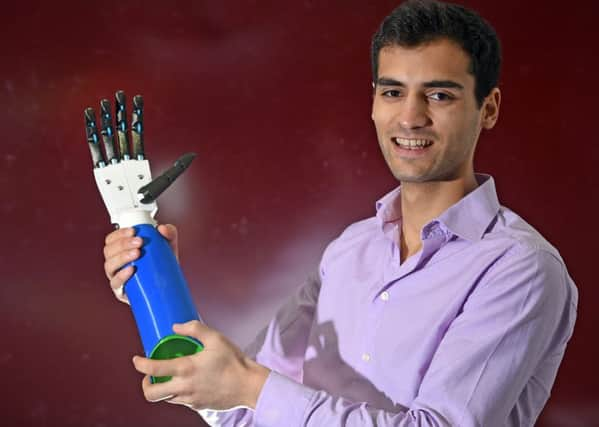Scottish students pioneer cut-price 3D-printed bionic arm


The team from the University of Edinburgh have set up their own company, Augment Bionics, and are looking to trial the product in the summer before bringing it to the market.
They are already working with medical professionals to fine-tune the prostheses, which currently have a raw material cost of £250 compared to the £5,000 price tag for high-functioning bionic limbs.
Advertisement
Hide AdAdvertisement
Hide AdAt the moment there are 33,000 upper-extremity amputees in the UK and demand for replacement limbs is expected to grow, due in part to increasing rates of diabetes.
The company is run by students, with technical and commercial teams from different academic backgrounds including scientists and people specialising in chemistry, business and economics.
Elisabeth Feldstein, a chemistry student at the university, said the team took inspiration from the thalidomide scandal in the 1960s that led to children being born without limbs.
She said: “When you see pictures of the arms that were available on the NHS even a decade ago they were extremely low in terms of functionality.
“One of the first things we did as a group was attend a talk by a curator at the National Museum of Scotland.
“She was talking about how during the thalidomide crisis a lot of people with missing limbs were forced to wear these low-functioning prosthetics.
“Obviously they have evolved a long way from the 1950s and 1960s, but a lot of the people back then ended up not doing well in school and not pursuing further education.
“This is something that can make a big difference to people’s lives and being able to provide them with that opportunity is important.”
Advertisement
Hide AdAdvertisement
Hide AdIn September 2017, Pedro Damas and Hubert Taczyński founded the original idea for Augment Bionics. Their work laid the foundation for the company, which allowed this years team to bring the project closer to a commercial product.
She added: “Last year it was just an idea and a project and this year we’ve worked on it to make a company and more of a commercial product.
“The initial inspiration was the fact that prosthetics that are bionic and have this high functionality cost upwards of £5,000 in the UK and the prosthetics that are available for free on the NHS are not nearly as functional.
“Our product is able to bridge that gap between the functionality and affordability.
“We want to stay within the £1,000 budget allocated by the NHS – so that to the user the product would still be free.
“We’re looking at different routes to market. One way would be to have a two-pronged approach with both the NHS and NGOs and charities working in a developing market.”